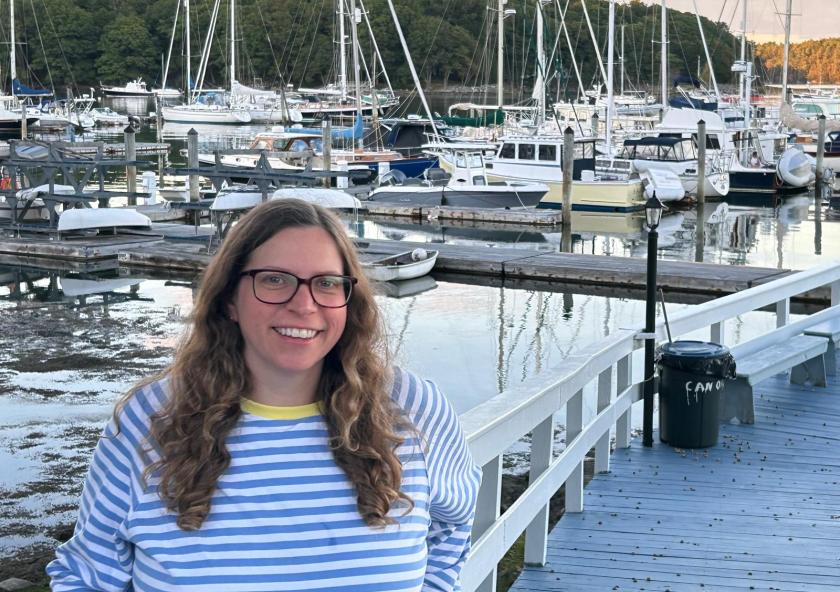
MITOS Alumni Interview: Rachel Perlman SM '15, PhD '20

Rachel Perlman graduated from MIT with a Master of Science in Technology and Policy in 2015, and a PhD in Engineering Systems from MIT’s Institute for Data, Systems, and Society (IDSS) in 2020. She is currently a consultant for Resource Recycling Systems (RRS). She joined MITOS in the fall of 2016 as a student fellow, working with the office to perform a comprehensive analysis of the MIT campus’s material flows. We recently caught up with Perlman as part of our Alumni Q+A series.
How did you originally connect to the Office of Sustainability?
When I was a PhD student at MIT and working to select my dissertation topic, I knew I wanted to do applied research related to sustainable materials management and within the US context. My PhD advisor at the time, [Professor and Director of the Environmental Solutions Initiative] John Fernández, helped me land on a project that analyzed MIT's material consumption and to do this work in connection to the Office of Sustainability. I engaged with [Director of Sustainability] Julie Newman, and she thought this collaboration was a great idea for my dissertation topic. I was able to simultaneously recruit Julie to be on my committee as a committee member and land a part time job at MITOS as a Sustainable Materials Management Fellow. It was a nice synergy. I later began working with [Assistant Director of Sustainability] Brian Goldberg when he first began with the office, so we delved into the topic together.
Tell me a little bit about your current role and your path to it?
I currently work as a consultant at Resource Recycling Systems (RRS). We’re a mission-driven consulting firm that specializes in sustainability, waste management, recycling, and circular economy issues. I work with public and private sector clients on issues such as recycling, diversion, waste reduction, packaging, and extended producer responsibility.
Between the time I left the Office of Sustainability (MITOS) and starting at RRS, I tried out different things. While was still at MIT, and after my time with MITOS, I worked part-time for the City of Somerville as a consultant on waste issues. I helped the city expand its compost program to the public schools. And then once I graduated, I worked on sustainable materials management policy; I worked for a nonprofit focused solely on extended producer responsibility, or EPR, which is a form of policy that promotes producers taking responsibility for products at the end of those products’ lifetime. I also worked on the safe takeback of pharmaceuticals and sharps. In all these positions, I focused on some aspect of waste and recycling. However, it took me some time to figure out what role and organization was the best fit for me.
What lessons did you take away from your experience with the Office of Sustainability?
It was beneficial for me to have a job at MITOS while doing my PhD, because it provided me with professional experience. It was also nice to have the Office’s community. I was in a highly interdisciplinary PhD program where people were studying all sorts of topics and systems, not necessarily related to sustainability. I was in the waste niche, and it was really helpful to become close to the MITOS community, which was composed of people who cared about university sustainability. The team served as thought partners who were thinking about the same issues. And then lastly, I just wouldn't have been able to get access to the data I needed for my research without MITOS’s partnership. With the Office backing this work, we were able to go to Vice President for Finance (VPF) Office and negotiate the reasonable conditions to get access to procurement data for my research. That would've been a much longer challenge and maybe not possible without MITOS signing off on this work.
What were your highlights from your time with the Office?
In academics, your work is supposed to be novel, build upon previous research, and ideally be published in academic journals. Those expectations can be intense for a lot of people, especially at MIT. In contrast, the expectations at MITOS were very practical. The approach was, “If we can't get perfect data, can we get reasonably good data?” My work at MITOS felt a lot more doable, since success was measured differently than it was in the academic world.
It was also nice to have someone like Julie Newman reading my work, because she had both an academic and a practical perspective, which was what I was hoping to establish for myself. I received mentorship from Julie and Brian Goldberg that was very helpful. I also had the opportunity to learn firsthand how to run a meeting, set an agenda, and work with different stakeholders. Those are skills I use every day. You don't necessarily learn those skills through a PhD program. But in a working environment, if you have a good team, you'll see that in practice, and ideally absorb it. Those learnings helped me succeed in the working world once I left MIT.
I also got speaking opportunities by being part of MITOS. I spoke a few times at Sustainability Connect and other events.
Another highlight of my time at MITOS was their big emphasis on the concept of a “living lab,” which my project was an example of. I really think the living lab model that is something more people and entities should adopt. If one has the power within a large entity like an organization or a university to run a pilot program to gain both learnings for operational improvements and possibly academic learnings, do it.

